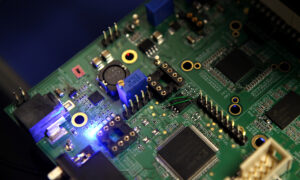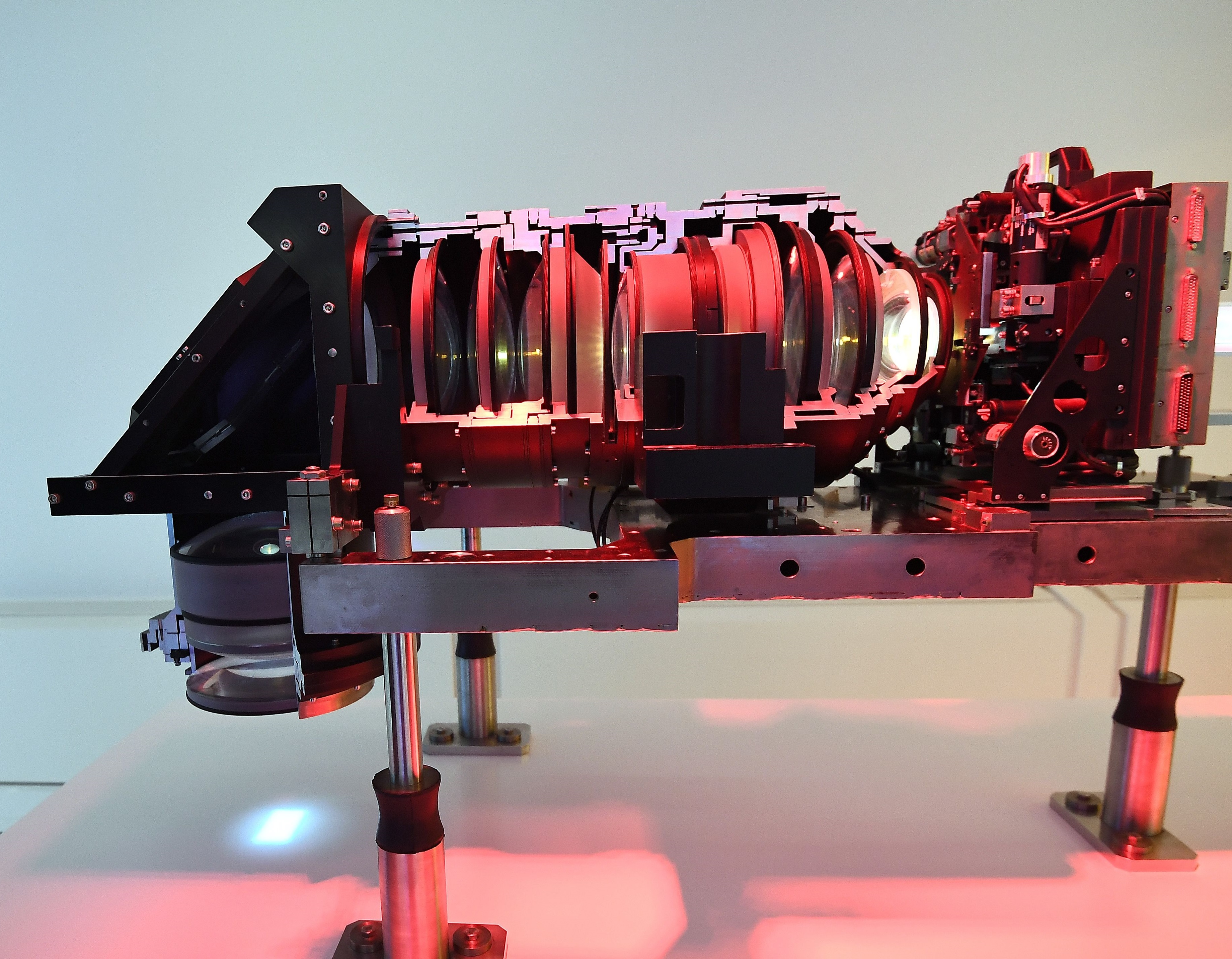In the United States’ Chip War With China, This European Country Must Choose Sides
CommentaryIn August, President Joe Biden signed into effect a bipartisan bill aimed at boosting U.S. competitiveness with China. Designed to create more chip factories, the bill received a great deal of praise—for a good reason. Dubbed the Chips and Science Act, it pledged tens of billions of dollars for U.S. companies producing computer chips. Moreover, certain chips and manufacturing equipment are now forbidden from being exported to China. Victory for the United States, some will say. Not so fast. There’s just one problem—and it’s a big one. The Netherlands, home to one of the most important chip manufacturers in the world, appears to care very little about the Chips and Science Act. What it does appear to care about, however, is helping China achieve semiconductor superiority over the United States. The Netherlands is known for its bicycles, tulips, windmills, wooden shoes, and tall people. In recent times, it has treated peaceful protesters like unruly thugs. This, perhaps, explains why the Dutch government is eager to embrace China, another country that views peaceful protesters in a distasteful manner. Headquartered in Veldhoven, a small town southwest of Eindhoven, Advanced Semiconductor Materials Lithography, more commonly referred to as ASML, is arguably the most important semiconductor company. This is because it’s the only company specializing in constructing extreme ultraviolet lithography (EUV) machines. The importance of these machines cannot be emphasized enough. They use a revolutionary type of lithography equipment required to make advanced processor chips. As American economist David P. Goldman recently discussed, ASML has loudly “opposed high-profile United States demands to stop selling its machines to China.” What’s more, he added, there’s no indication the Dutch government is prepared to accept the Biden administration’s request, even if some reports suggest otherwise. Why would it? After all, as Goldman noted, ASML has already sold roughly 200 deep ultraviolet (DUV) units to chip manufacturers in China. To put these sales in perspective, one of these machines costs a staggering $160 million (ASML is currently working on an upgrade that could cost as much as $400 million). Goldman quoted Trade Minister Liesje Schreinemacher, who, when asked about sales to China, responded that it was important for the Netherlands to defend its own interests, including “national safety” and the country’s “economic interests.” It’s important to remember that China already produces far more semiconductors than any other country, the United States included. In fact, China now produces one-quarter of all semiconductors in circulation. By 2025, China plans to funnel well over $1.4 trillion into semiconductor research and manufacturing (in comparison, the Chips Act is pumping just $52 billion into similar endeavors). Beijing means business. As its relationship with the Netherlands becomes more intimate, China’s vise-like grip over the semiconductor industry will surely tighten. The United States could find itself left in the dust. A view of a lens used in the manufacturing of semiconductor circuits at Dutch company ASML, which is currently the largest supplier in the world of semiconductor manufacturing machines via photolithography systems, in Veldhoven, Netherlands, on April 17, 2018. (Emmanuel Dunand/AFP via Getty Images) The Growing Bond Between the Netherlands and China For years, the Netherlands has been considered a close ally of the United States. Today, although relations with the United States are far from dire, they’re not exactly rock solid. At the same time, Dutch relations with China have never been stronger. It is now 50 years since ambassadorial-level diplomatic relations between China and the Netherlands were established. The Netherlands is now one of China’s most important trading partners in Europe. Very soon, if current trends continue, it could become China’s most important trading partner. According to China’s Ministry of Foreign Affairs, the two countries are working tirelessly to “intensify high-level exchanges, strengthen political mutual trust, and keep the bilateral relations on the right track.” Vague declarations aside, advanced technology is the main motive for Chinese investment in the Netherlands. What’s more advanced than high-tech semiconductor machinery? The Netherlands’ embrace of China must be viewed more broadly. Other European heavyweights like France and Germany are also eagerly embracing the Chinese Communist Party (CCP). As I write this, the French government is actively working with Beijing to construct seven infrastructure projects in Africa, South East Asia, and parts of Eastern Europe. Meanwhile, Germany, the most powerful European country, finds itself beholden to Beijing. The German economy, we’re told, would simply crumble without support from China. Like the Netherlands, the fate of these two countries—two staunch allies of the United States, I

Commentary
In August, President Joe Biden signed into effect a bipartisan bill aimed at boosting U.S. competitiveness with China. Designed to create more chip factories, the bill received a great deal of praise—for a good reason. Dubbed the Chips and Science Act, it pledged tens of billions of dollars for U.S. companies producing computer chips. Moreover, certain chips and manufacturing equipment are now forbidden from being exported to China.
Victory for the United States, some will say. Not so fast. There’s just one problem—and it’s a big one. The Netherlands, home to one of the most important chip manufacturers in the world, appears to care very little about the Chips and Science Act. What it does appear to care about, however, is helping China achieve semiconductor superiority over the United States.
The Netherlands is known for its bicycles, tulips, windmills, wooden shoes, and tall people. In recent times, it has treated peaceful protesters like unruly thugs. This, perhaps, explains why the Dutch government is eager to embrace China, another country that views peaceful protesters in a distasteful manner.
Headquartered in Veldhoven, a small town southwest of Eindhoven, Advanced Semiconductor Materials Lithography, more commonly referred to as ASML, is arguably the most important semiconductor company. This is because it’s the only company specializing in constructing extreme ultraviolet lithography (EUV) machines. The importance of these machines cannot be emphasized enough. They use a revolutionary type of lithography equipment required to make advanced processor chips.
As American economist David P. Goldman recently discussed, ASML has loudly “opposed high-profile United States demands to stop selling its machines to China.” What’s more, he added, there’s no indication the Dutch government is prepared to accept the Biden administration’s request, even if some reports suggest otherwise.
Why would it? After all, as Goldman noted, ASML has already sold roughly 200 deep ultraviolet (DUV) units to chip manufacturers in China. To put these sales in perspective, one of these machines costs a staggering $160 million (ASML is currently working on an upgrade that could cost as much as $400 million).
Goldman quoted Trade Minister Liesje Schreinemacher, who, when asked about sales to China, responded that it was important for the Netherlands to defend its own interests, including “national safety” and the country’s “economic interests.” It’s important to remember that China already produces far more semiconductors than any other country, the United States included. In fact, China now produces one-quarter of all semiconductors in circulation. By 2025, China plans to funnel well over $1.4 trillion into semiconductor research and manufacturing (in comparison, the Chips Act is pumping just $52 billion into similar endeavors). Beijing means business. As its relationship with the Netherlands becomes more intimate, China’s vise-like grip over the semiconductor industry will surely tighten. The United States could find itself left in the dust.

The Growing Bond Between the Netherlands and China
For years, the Netherlands has been considered a close ally of the United States. Today, although relations with the United States are far from dire, they’re not exactly rock solid. At the same time, Dutch relations with China have never been stronger.
It is now 50 years since ambassadorial-level diplomatic relations between China and the Netherlands were established. The Netherlands is now one of China’s most important trading partners in Europe. Very soon, if current trends continue, it could become China’s most important trading partner. According to China’s Ministry of Foreign Affairs, the two countries are working tirelessly to “intensify high-level exchanges, strengthen political mutual trust, and keep the bilateral relations on the right track.” Vague declarations aside, advanced technology is the main motive for Chinese investment in the Netherlands. What’s more advanced than high-tech semiconductor machinery?
The Netherlands’ embrace of China must be viewed more broadly.
Other European heavyweights like France and Germany are also eagerly embracing the Chinese Communist Party (CCP).
As I write this, the French government is actively working with Beijing to construct seven infrastructure projects in Africa, South East Asia, and parts of Eastern Europe. Meanwhile, Germany, the most powerful European country, finds itself beholden to Beijing. The German economy, we’re told, would simply crumble without support from China. Like the Netherlands, the fate of these two countries—two staunch allies of the United States, I might add—is inextricably linked with China.
Does the United States, the “city on the hill,” still have the same authority it once had five or ten years ago? That question is up for debate, but you would be forgiven for answering with a resounding “no!” For a number of Western countries, the “city” has lost its allure. That’s why they are now looking East, not West, for support, be it financial or otherwise.
Views expressed in this article are the opinions of the author and do not necessarily reflect the views of The Epoch Times.












